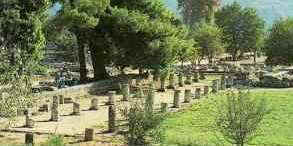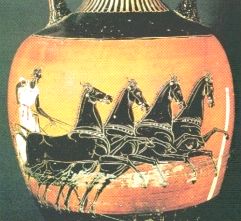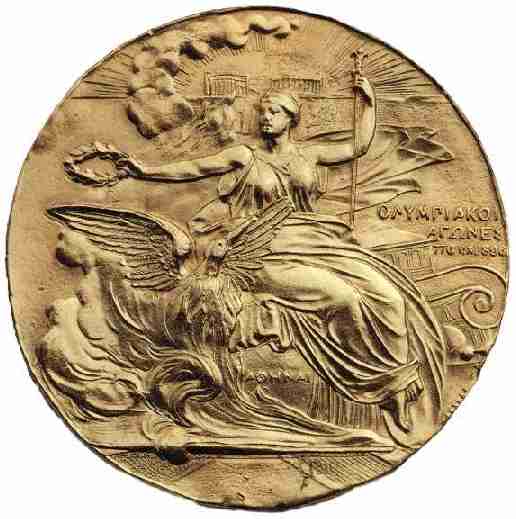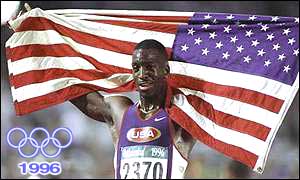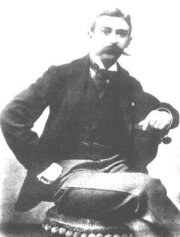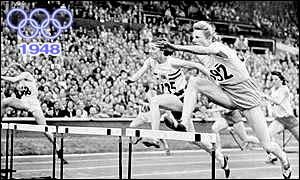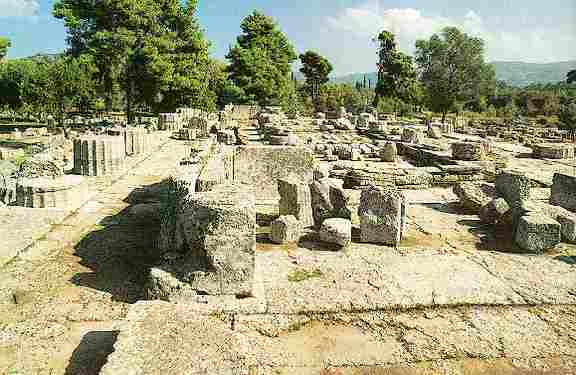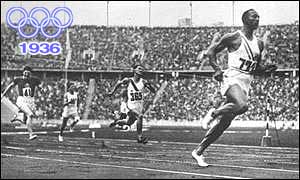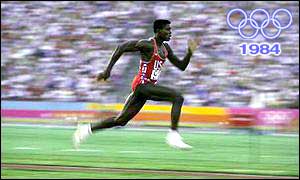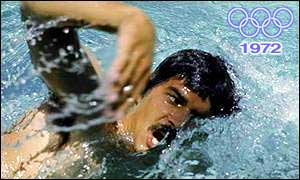|
|
||||||||
|
HOME | BIOLOGY | BOOKS | FILMS | GEOGRAPHY | HISTORY | INDEX | INVESTORS | MUSIC | NEWS | SOLAR BOATS | SPORT |
||||||||
|
The Ancient Olympic Games
Although the ancient Olympic games were first recorded in 776 BC, they originated at least a century before that and possibly as early as the 13th century BC.
One Greek legend said that the great Herakles (Hercules, in the Roman form) won a race at Olympia, a plain in the small state of Elis, and then decreed that the race should be re-enacted every four years. Another said that Zeus himself had originated the festival after defeating Cronus for the sovereignty of heaven.
Olympic Gymnasium 776 BC
The more likely story is that the Olympic festival was a local religious event until 884 BC, when Iphitus, the king of Elis, decided to turn it into a broader, pan-Hellenic festival. To accomplish that, he entered into a temporary truce with other rulers, allowing athletes and others to travel peacefully to Olympia while the festival was going on.
The Greeks based their chronology on four-year periods called Olympiads, and the Olympic festival marked the beginning of each Olympiad. Evidently, the festival was reorganized in 776 BC, which was considered the start of the first Olympiad.
The festival was basically a religious gathering to celebrate the gods worshipped in common by all Hellenes, primarily Zeus. There were three other major pan-Hellenic festivals, the Pythian, the Nemean, and the Isthmian, all of which included fairs, but the festival at Olympia became pre-eminent by 572 BC, when Elis and Sparta entered into an alliance under which Elis was in charge of the event itself while Sparta enforced the sacred truce.
A single foot race was the only athletic event until the fifteenth Olympiad. The race was the length of the stadium, approximately 200 yards. As time went on, the games associated with the festival expanded and became increasingly important. A race of two stadium lengths was added in 724 and a long-distance race of 24 stadium lengths (about 2.5 miles) was added in 720.
Other types of sports followed quickly: Wrestling and the pentathlon in 708, boxing in 688, chariot racing in 680, and the pancratium, a combination of boxing and wrestling, in 748. At one time or another, there were 23 Olympic sports events, although they were never all held at the same festival.
A branch of wild olive was the only official prize for an Olympic winner, but there were also usually some unofficial prizes awarded by his city-state. For example, Athens allowed an Olympic champion to live free of charge in the Pyrtaneum, a special hall set aside for distinguished citizens. Other city-states exempted winners from taxes for an Olympiad, and in some cases citizens contributed to a cash award.
Athletes had to arrive in Elis a month before the games to undergo spiritual, moral, and physical training under the supervision of the judges, who then decided which of them were genuinely qualified to compete. Each competitor had to swear an oath that he was a free-born Greek who had committed no sacrilege against the gods.
At first, the games took up only one day of the festival. That was extended to two days in 680, with the addition of chariot racing, and to five days in 632. However, only three of those days were actually devoted to competition. The first day was devoted to religious sacrifices, the registration of athletes, and the taking of the Olympic oath. Prizes were awarded and thanksgiving sacrifices were offered on the fifth day.
Athletes usually competed nude. They originally wore shorts but, according to one ancient writer, Pausanias, a competitor deliberately lost his shorts so that he could run more freely during the race in 720 BC, and clothing was then abolished.
Women were not allowed to watch the games, but that had nothing to do with the nudity of the male athletes. Rather, it was because Olympia was dedicated to Zeus and was therefore a sacred area for men. The chariot races, which were held outside the sacred precinct, were open to women spectators. (Women had their own sacred festivals from which men were banned, most notably the Heraean festival at Argos, which included a javelin throwing competition.)
Olympic coin
At its peak during the 4th century BC, the Olympic festival drew crowds not only from the Pelopponesian Peninsula but from colonies as far away as Libya and Egypt. Poets and other writers recited spontaneously, sculptors worked on statues while surrounded by spectators, vendors sold food from stalls, traders from throughout the peninsula sold horses.
Traveling to Olympia took on the nature of a pilgrimage, which attracted some of the greatest names of Greece's classic period. Plato attended the festival when he was seventy. Demosthenes, Diogenes the Cynic, Pythagoras, and Themistocles all visited Olympia at one time or another. The young Thucydides was in the audience when Herodotus, the "father of history," read from his works.
Even after the glory that was Greece vanished, the Olympics lived on, but in a debased form under the Romans, who replaced the traditional games with their own gladiatorial contests, in which slaves replaced free-born Greeks as the competitors.
In 394 AD, Theodosius the Great decreed an end to the Olympic Games. But they had lasted more than a thousand years, perhaps as long as 1600 years, and certainly longer than any other secular institution in history. And they left behind an ember that was to burst again into flame in the late 19th century.
The 19th-Century Olympic Movement
Baron Pierre de Coubertin, a Frenchman, is justly given credit for establishing the modern Olympics, but it was England that revived the idea, and it was in England that Coubertin was introduced to it.
As early as 1612, Robert Dover established an English version of the Olympic Games in the Cotswold Hills in Gloucestershire. Events included card games, chess, and dancing, as well as running, jumping, the hammer throw, pitching the bar, wrestling, and horse racing.
During the 18th century, students at Cambridge University staged some kind of Olympic Games, but it's not known exactly when they were held or what sports were involved, if any.
The Olympic idea was definitely in the air in 19th-century England. The Baron de Berenger held an Olympic Festival at Chelsea Stadium in London in 1832. To commemorate Queen Victoria's coronation, he staged another festival in 1838, which included archery, gymnastics, cricket, fencing, rowing, sailing, and target shooting with both rifle and pistol.
By far the most important of such events was the annual Olympic festival at Much Wenlock, Shropshire, which began in 1850. William "Penny" Brooke, a life-long campaigner for physical education, organized the games, which included cricket, hurdling, jumping, quoits, running, and soccer.
The Much Wenlock Games were originally designed for youngsters--there was an even a race for children under seven--but they eventually grew to include older athletes. They also drew some attention from Europe and the German Gymnastics Society began sending a team to England to compete in various events.
In 1861, Brooke organized the Shropshire Olympian Association, which led to the founding of the National Olympian Association four years later. Brooke's goal was to create an international Olympics, primarily to promote physical education in participating countries.
Brooke never achieved that goal. But, in 1890, he was visited by Coubertin, who was eager to learn about the Much Wenlock games and the Olympian Society, and Brooke was very helpful to the young Frenchman who shared his interest in physical education and his dream of an international Olympic festival.
Born in 1863, Coubertin had grown up in the shadow of his country's devastating defeat in the Franco-Prussian War of 1870-71. He decided that France had lost the war due to physical and spiritual flabbiness caused primarily by poor educational methods.
A boxer, fencer, and rower as a young man, Coubertin determined to devote his life to education and, especially, to physical education. His ideas fit in exactly with England's "muscular Christianity" movement, which espoused moral and intellectual development based on physical fitness.
Coubertin visited England several times to see first-hand how sport was used in public schools, and he also traveled to the United States with the same goal. In 1889, he organized the Congress of Physical Education in Paris and the following year he made his visit to Much Wenlock to talk to "Penny" Brooke about the Olympian Society.
The idea of reviving the Olympics as a true international festival grew out of that meeting. Coubertin began openly espousing the idea in 1892, but attracted little notice. Despite repeated rebuffs, not only from his own countrymen but from the English and the Americans as well, Coubertin persisted. On June 23, 1894, he presided over a meeting of 79 delegates, representing 12 countries, who unanimously voted for the restoration of the Olympic games. As a result, the International Olympic Committee (IOC) was organized, with the goal of staging the first modern Olympics in Paris in 1900. Pressed by Coubertin, the IOC soon decided to aim for 1896, with Athens as the site.
That idea, too, met with resistance, especially from the government of Greece. But when Georgios Averoff of Alexandria donated 920,000 gold drachmas to build an Olympic stadium in Athens, the resistance folded, and the King of Greece himself opened the first modern Olympic Games on April 5, 1896 (March 24 on the Greek calendar).
To the traditional events of track and field athletics, which include the decathlon and heptathlon, have been added a host of games and sports—archery, badminton, baseball and softball, basketball, boxing, canoeing and kayaking, cycling, diving, equestrian contests, fencing, field hockey, gymnastics, judo and taekwondo, the modern pentathlon, rowing, sailing, shooting, soccer, swimming, table tennis, team (field) handball, tennis, trampoline, the triathlon, volleyball, water polo, weight lifting, and wrestling.
Fanny Blanker-Koen
Olympic events for women made their first appearance in 1912. A separate series of winter Olympic meets, inaugurated (1924) at Chamonix, France, now includes ice hockey, curling, bobsledding, luge, skeleton, and skiing, snowboarding, and skating events. Since 1994 the winter games have been held in even-numbered years in which the summer games are not contested. Until late in the 20th cent. the modern Olympics were open only to amateurs, but the governing bodies of several sports now permit professionals to compete as well.
As a visible focus of world energies, the Olympics have been prey to many factors that thwarted their ideals of world cooperation and athletic excellence. As in ancient Greece, nationalistic fervor has fostered intense rivalries that at times threatened the survival of the games. Although officially only individuals win Olympic medals, nations routinely assign political significance to the feats of their citizens and teams. Between 1952 and 1988 rivalry between the United States and the Soviet Union, rooted in mutual political antagonism, resulted in each boycotting games hosted by the other (Moscow, 1980; Los Angeles, 1984).
Politics has influenced the Olympic games in other ways, from the propaganda of the Nazis in Berlin (1936) to pressures leading to the exclusion of white-ruled Rhodesia from the Munich games (1972). At Munich, nine Israeli athletes were kidnapped and murdered by Palestinian terrorists. The International Olympic Committee (IOC), which sets and enforces Olympic policy, has struggled with the licensing and commercialization of the games, the need to schedule events to accommodate American television networks (whose broadcasting fees help underwrite the games), and the monitoring of athletes who seek illegal competitive advantages, often through the use of performance-enhancing drugs. The IOC itself has also been the subject of controversy.
In 1998 a scandal erupted with revelations that bribery and favoritism had played a role in the awarding of the 2002 Winter Games to Salt Lake City, Utah, and in the selection of some earlier venues. As a result, the IOC instituted a number of reforms including, in 1999, initiating age and term limits for members and barring them from visiting cities bidding to be Olympic sites.
THE INTERNATIONAL OLYMPIC COMMITTEE
The IOC exists to serve as an umbrella organisation of the Olympic Movement. It owns all rights to the Olympic symbols, flag, motto, anthem and Olympic Games. Its primary responsibility is to supervise the organisation of the summer and winter Olympic Games.
PRESIDENTS
The IOC President is elected by the IOC members by secret ballot for an initial term of eight years, renewable once for four additional years. The President presides over all activities of the IOC, acting as its permanent representative. The current President, since 16 July 2001, is Jacques Rogge, of Belgium.
EXECUTIVE
BOARD
MEMBERS
ADMINISTRATION
IOC LINKS:
Introduction
to the Olympic Movement
The IOC were concerned about the Nazis' rise to power in Germany but following the successful Winter Olympics in Germany earlier that year, Berlin was able to host the Games. Many countries, particularly the United States, proposed boycotting the Games but the only notable absentees were Spain who withdrew due to the outbreak of civil war.
The Games were opened by Adolf Hitler and a number of teams gave the Nazi salute during the opening ceremony although Great Britain and the United States abstained.
The star of the Games was American Jesse Owens with four gold medals in the 100m, 200m, long jump and as a member of the 4x100m relay team. However it was the powerful German team, backed fully by the government, that topped the medals table. The host nation picked up 33 golds, with the US collecting 24 and Hungary ten. Canoeing, basketball and outdoor 11-a-side handball all made their Olympic debuts. Because of the Second World War these were to be the last Olympics until 1948.
Not even a terrorist bomb that went off in Centennial Park and left two people dead and more than 100 injured could overshadow the success of the Atlanta Games. Chosen ahead of Athens to host the Games that celebrated the centenary of the modern Olympic movement, Atlanta proved to be a fitting venue. The Olympic flame was movingly lit by Muhammad Ali, and when the competition got underway there were some outstanding performances. America's Michael Johnson achieved a 200m and 400m double that included a 200m world record of 19.32 seconds.
Carl Lewis picked up his ninth Olympic gold, spread over four Games by winning the long jump. Britain's Steve Redgrave won his fourth gold in successive Games and led to him being hailed by many as Britain's greatest ever Olympian. But defending 100m champion Linford Christie was disqualified after two false starts leaving Canada's Donovan Bailey to take his crown in a new world record of 9.84 seconds.
In 2004 the Olympic Games returned to Greece, the home of both the ancient Olympics and the first modern Olympics. For the first time ever a record 201 National Olympic Committees (NOCs) participated in the Olympic Games. The overall tally for events on the programme was 301 (one more than in Sydney 2000). Popularity in the Games reached soared to new highs as 3.9 billion people had access to the television coverage compared to 3.6 billion for Sydney 2000. Women's wrestling was included in the program for the first time. Swimmer Michael Phelps won 6 gold medals and set a single-Games record with 8 total medals.
Leontien Ziljaard-van Moorsel became the first female cyclist to earn 4 career gold medals and 6 total medals, while canoeist Birgit Fischer became the first athlete in any sport to win two medals in each of 5 Olympics. Runner Hicham El Guerrouj won both the 1,500m and the 5,000m, while on the women's side Kelly Holmes triumphed in both the 800m and the 1,500m. In team play, Argentina won the men's football tournament without giving up a goal, and the U.S. softball team won by outscoring their opponents 51-1.
A - Z SPORTS INDEX
DNA experimenters produce super athletes to infiltrate all walks of life.
LINKS :
International Olympic Committee (IOC) - History, profiles, current news, Olympic sports Official site of the 2004 Athens Olympics Olympic Almanac - A lot of hard-to-find information, such as Olympic logos and mascots. Olympic Studies Centre - Includes a directory of Olympic research, forums, and helpful links. U.S. Olympic Committee - An excellent site, full of information on all Olympic sports. Amateurism
A taste for adventure
Solar Cola - a healthier alternative
|
||||||||
|
This website is Copyright © 1999 & 2012 Max Energy Limited, an environmental educational charity working hard for world peace. The names Solar Navigator™,Blueplanet Ecostar BE3™ and Utopia Tristar™ are trademarks. All other trademarks are hereby acknowledged. |
||||||||
|
AUTOMOTIVE | BLUEPLANET | ELECTRIC CARS | ELECTRIC CYCLES | SOLAR CARS | SOLARNAVIGATOR |
||||||||
